Unit_3_my_weekend_plan教案
人教PEP版英语六上《Unit 3 My weekend plan》word第四课时教案
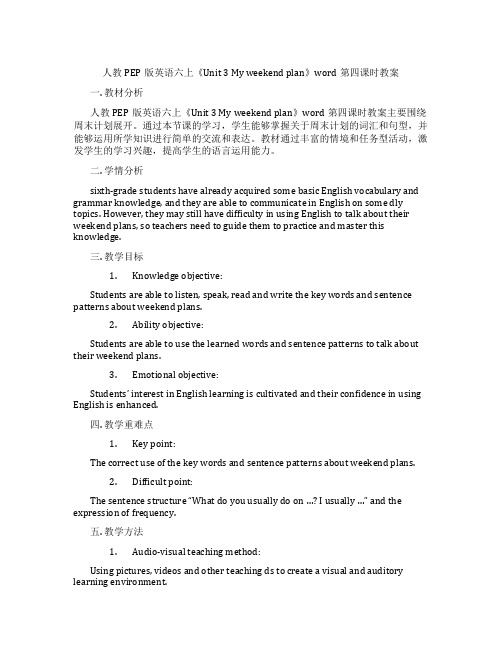
人教PEP版英语六上《Unit 3 My weekend plan》word第四课时教案一. 教材分析人教PEP版英语六上《Unit 3 My weekend plan》word第四课时教案主要围绕周末计划展开。
通过本节课的学习,学生能够掌握关于周末计划的词汇和句型,并能够运用所学知识进行简单的交流和表达。
教材通过丰富的情境和任务型活动,激发学生的学习兴趣,提高学生的语言运用能力。
二. 学情分析sixth-grade students have already acquired some basic English vocabulary and grammar knowledge, and they are able to communicate in English on some dly topics. However, they may still have difficulty in using English to talk about theirweekend plans, so teachers need to guide them to practice and master this knowledge.三. 教学目标1.Knowledge objective:Students are able to listen, speak, read and write the key words and sentence patterns about weekend plans.2.Ability objective:Students are able to use the learned words and sentence patterns to talk about their weekend plans.3.Emotional objective:Students’ interest in English learning is cultivated and their confidence in using English is enhanced.四. 教学重难点1.Key point:The correct use of the key words and sentence patterns about weekend plans.2.Difficult point:The sentence structure “What do you usually do on …? I usually …” and the expression of frequency.五. 教学方法1.Audio-visual teaching method:Using pictures, videos and other teaching ds to create a visual and auditory learning environment.2.Task-based teaching method:Organizing students to participate in various tasks and activities, stimulating their interest in learning and improving their language ability.3.Cooperative learning:Encouraging students to work together in groups, promoting communication and cooperation among students.六. 教学准备1.Teaching materials:Pictures, videos, worksheets, etc.2.Teaching equipment:Projector, computer, whiteboard, etc.七. 教学过程1.Introduction (5 minutes)a.Greeting and warm-upb.Review the previous knowledge2.Presentation (10 minutes)a.Show pictures and ask questions to lead students to guess the topic ofthe lessonb.Introduce the new words and sentence patterns related to weekendplans3.Practice (15 minutes)a.Ask students to read and practice the new words and sentencepatternsb.Conduct role-playing activities among students, using the new wordsand sentence patterns4.Consolidation (10 minutes)a.Ask students to make a list of their weekend plans and share withtheir partnersb.Invite some students to give a presentation about their weekend plans5.Extension (5 minutes)a.Ask students to think about the questions: “What do you usually do onholidays? What do you want to do in the future?” and discuss with theirpartnersb.Share the answers with the class6.Summary (5 minutes)a.Ask students to summarize what they have learned in this lessonb.Teacher makes necessary supplements and emphasizes theimportance of practicing English in dly life7.Homework (5 minutes)a.Ask students to write a short passage about their weekend plansb.Ask students to practice the new words and sentence patterns withtheir parents or friends8.Blackboard (5 minutes)a.Write the key words and sentence patterns on the blackboard forstudents to refer tob.Remind students to review the lessons regularlyNote: The time allocation in this lesson plan is for reference only, and the actual teaching process may vary depending on the actual situation.针对以上教案对教学情境和教学活动的分析:一、教学情境本节课以学生熟悉的周末计划为话题,通过情境创设,激发学生的学习兴趣。
Unit 3 My weekend plan (教案)人教版(PEP三起)六年级英语上册
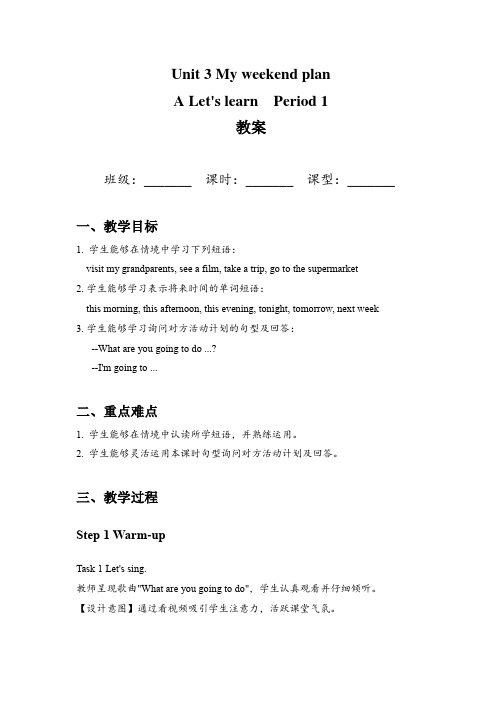
Unit 3 My weekend planA Let's learn Period 1教案班级:_______ 课时:_______ 课型:_______一、教学目标1. 学生能够在情境中学习下列短语:visit my grandparents, see a film, take a trip, go to the supermarket2.学生能够学习表示将来时间的单词短语:this morning, this afternoon, this evening, tonight, tomorrow, next week 3.学生能够学习询问对方活动计划的句型及回答:--What are you going to do ...?--I'm going to ...二、重点难点1. 学生能够在情境中认读所学短语,并熟练运用。
2. 学生能够灵活运用本课时句型询问对方活动计划及回答。
三、教学过程Step 1 Warm-upTask 1 Let's sing.教师呈现歌曲"What are you going to do",学生认真观看并仔细倾听。
【设计意图】通过看视频吸引学生注意力,活跃课堂气氛。
教师逐一点击屏幕出现短语,学生大声说出相应短语。
【设计意图】通过练习初步了解本课时要学习的内容。
Step 2 PresentationTask 1 Let's listen.(1)教师呈现Chen Jie和Sarah打电话的情境。
(2)教师呈现对话,并播放音频让学生跟读(3)教师由句子引出本课时重点单词短语,并播放音频让学生跟读。
(4)教师逐个讲解本课时学习的单词短语。
【设计意图】通过情境和对话引出单词短语,带领学生学习本课时单词短语和对话,教师纠正学生发音。
Task 2 Listen and imitate.教师呈现本课时所学单词短语和对话,点击屏幕播放音频,学生认真倾听并模仿朗读。
Unit3MyWeekendPlan(教学设计)-2024-2025学年人教PEP版英语六年级上册

- 建议学生制定一个“英语周末计划”,用英语写下自己周末的详细活动,并在班级内分享,以增强写作和口语表达能力。
- 组织一次“周末计划”主题的英语角活动,让学生在轻松的氛围中练习用英语交流个人计划,提升交际能力。
- 鼓励学生通过绘制思维导图的方式,总结和复习本节课所学的词汇和句型,加深记忆和理解。
过程:
简要回顾本节课的学习内容,包括关键句型、时态运用和案例分析等。
强调学会表达个人计划对于日常交流的重要性,鼓励学生在生活中积极运用所学知识。
布置课后作业:让学生撰写一篇关于自己周末计划的英语短文,以巩固学习效果。
六、教学资源拓展
1. 拓展资源:
- 建议学生阅读与周末活动相关的英语绘本或故事书,如《The Berenstain Bears' Week at Grandma's》等,以丰富词汇量和理解不同的文化背景。
- 观看英语动画片或教育节目中的周末活动片段,如《Peppa Pig》中关于周末去公园、野餐等情节,以提高听力理解能力。
- 收集并学习关于周末活动的英文歌曲,如《Lazy Sunday》等,通过歌曲学习轻松掌握相关表达。
- 了解和收集英语国家的节假日活动信息,对比不同文化下的周末活动差异。
2. 拓展建议:
- 如何构造简单的未来计划句型,如 "I'm going to..."、"We will..."。
② 重点词句:
- 句型:"What are you going to do...?" 用于询问未来的计划。
- 句型:"I'm going to..." 或 "We will..." 用于表达个人的未来计划。
《Unit 3 My weekend plan》教学设计
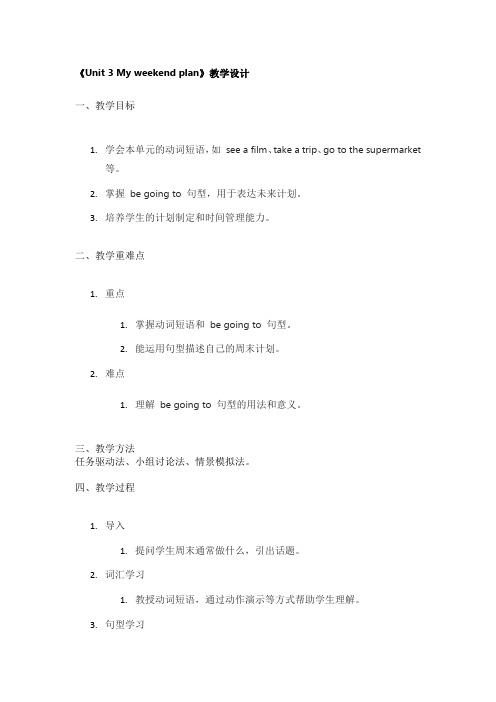
《Unit3My weekend plan》教学设计
一、教学目标
1.学会本单元的动词短语,如see a film、take a trip、go to the supermarket
等。
2.掌握be going to句型,用于表达未来计划。
3.培养学生的计划制定和时间管理能力。
二、教学重难点
1.重点
1.掌握动词短语和be going to句型。
2.能运用句型描述自己的周末计划。
2.难点
1.理解be going to句型的用法和意义。
三、教学方法
任务驱动法、小组讨论法、情景模拟法。
四、教学过程
1.导入
1.提问学生周末通常做什么,引出话题。
2.词汇学习
1.教授动词短语,通过动作演示等方式帮助学生理解。
3.句型学习
1.讲解be going to句型,举例说明用法。
4.小组活动
1.小组讨论周末计划,并用be going to句型进行汇报。
5.情景模拟
1.模拟周末活动场景,让学生进行对话练习。
6.总结
1.总结周末计划的表达和时间管理的重要性。
7.作业
1.写一篇自己的周末计划作文。
人教PEP版英语六上《Unit 3 My weekend plan》教案

人教PEP版英语六上《Unit 3 My weekend plan》教案一. 教材分析《Unit 3 My weekend plan》是人教PEP版英语六上册的一单元,主题是关于周末计划的描述。
本节课通过谈论人们的周末活动,让学生学会表达自己的周末计划,并能够询问他人的周末安排。
教材包括三个部分:Part A, Part B和Part C。
Part A和Part B主要是通过听力、口语和阅读活动来练习本节课的重点词汇和句型,而Part C则是通过写作活动来巩固所学内容。
二. 学情分析学生在进入本节课之前,已经学习了有关日常活动的词汇和句型,如go shopping, visit friends等。
他们具备一定的听、说、读、写的能力,但对于一些复杂的情境和表达方式还需要进一步引导和练习。
因此,在教学过程中,需要关注学生的个体差异,给予不同层次的学生适当的指导和帮助。
三. 教学目标1.知识目标:–能够听懂、会说、会读本节课的重点词汇和句型,如go swimming, play basketball等。
–能够正确运用一般现在时描述自己的周末计划。
2.能力目标:–能够用英语简单描述自己的周末计划,并能够询问他人的周末安排。
–能够听懂他人的描述,并进行适当的反馈。
3.情感目标:–激发学生对英语学习的兴趣,培养他们积极学习的态度。
–培养学生与人分享和交流的习惯,提高他们的团队协作能力。
四. 教学重难点•能够听懂、会说、会读本节课的重点词汇和句型。
•能够用英语描述自己的周末计划,并能够询问他人的周末安排。
•正确运用一般现在时描述自己的周末计划。
•听懂他人的描述,并进行适当的反馈。
五. 教学方法1.任务型教学法:通过设定各种任务,让学生在实际情境中运用所学知识,提高他们的语言实际运用能力。
2.情境教学法:通过创设各种情境,让学生在轻松愉快的氛围中学习英语,提高他们的学习兴趣。
3.交际法:通过生生、师生之间的互动,培养学生的交际能力,提高他们的语言实际运用能力。
人教PEP版英语六上Unit 3《My weekend plan》(A Let’s learn )教

人教PEP版英语六上Unit 3《My weekend plan》(A Let’s learn )教学设计一. 教材分析《人教PEP版英语六上Unit 3 My weekend plan》主要讲述的是学生周末计划的表达。
通过本节课的学习,学生能够掌握描述周末活动的词汇和句型,并能用英语进行简单的交流和表达。
本节课的主要内容是学习一般将来时态的疑问句和回答。
教材中提供了丰富的图片和情境,帮助学生更好地理解和运用所学知识。
二. 学情分析学生在学习本节课之前,已经掌握了基本的日常英语对话,并能运用一般现在时描述自己的日常活动。
但是,对于一般将来时态的疑问句和回答还比较陌生,需要通过本节课的学习来掌握。
此外,学生对于描述周末活动的词汇和句型也较为陌生,需要通过大量的操练和实践来熟练运用。
三. 教学目标1.学生能够听懂、会说、会读本节课所学的词汇和句型,如:playbasketball, go shopping, visit my grandparents等。
2.学生能够运用一般将来时态的疑问句和回答询问和描述将来的活动。
3.学生能够通过本节课的学习,提高自己的英语交流能力和表达能力。
四. 教学重难点1.教学重点:学生能够掌握描述周末活动的词汇和句型,并能用英语进行简单的交流和表达。
2.教学难点:学生能够运用一般将来时态的疑问句和回答询问和描述将来的活动。
五. 教学方法本节课采用任务型教学法,通过各种形式的活动和任务,激发学生的学习兴趣,提高学生的参与度和积极性。
同时,采用交际法,让学生在真实的语言环境中进行英语交流,培养学生的语言运用能力。
六. 教学准备1.教学课件:根据教材内容,制作精美的教学课件,配合教学活动,帮助学生更好地理解和掌握所学知识。
2.教学道具:准备与本节课相关的图片、卡片等道具,用于呈现和操练所学词汇和句型。
3.教学资源:收集一些关于周末活动的视频或图片,用于拓展学生的视野,丰富学生的学习资源。
Unit 3 My weekend plan 教学设计

《My weekend plan》教学设计方案(第一课时)一、教学目标:1. 学生能够理解和运用基本的短语“this weekend”和“next weekend”以及句子“What are you going to do...?”来描述周末计划。
2. 学生能够理解并简单表达自己的周末计划,并能够根据实际情况进行简单的交流。
3. 培养学生的口语表达能力和自信心。
二、教学重难点:1. 重点:学生能够理解和运用基本的周末计划表达方式。
2. 难点:学生能够在实际生活中运用英语表达自己的周末计划,并克服语言障碍。
三、教学准备:1. 准备一些关于周末活动的图片或视频,帮助学生理解不同的活动词汇。
2. 准备一些简单的周末计划卡片,供学生练习使用。
3. 收集一些学生的周末计划图片或视频,用于课堂讨论和分享。
4. 录音或歌曲,用于课堂热身和放松。
四、教学过程:1. 热身环节(5分钟)(1)播放一首关于周末活动的歌曲,帮助学生放松心情,营造英语氛围。
(2)进行一些简单的口语练习,如:“What are you doing today? I am…”引导学生进入英语口语表达的情境。
2. 新课导入(5分钟)展示一些周末活动的图片,引导学生用简单的英语描述图片上的活动,如:“They are playing football.”帮助学生建立英语表达的自信心。
3. 学习新词汇和句型(15分钟)(1)教师逐一呈现新词汇,并带领学生朗读。
(2)教师逐一介绍新句型,并引导学生理解其意思。
(3)教师引导学生通过对话练习新词汇和句型,帮助学生进一步理解和掌握。
4. 小组活动(10分钟)将学生分成小组,每个小组选择一个周末活动进行对话练习。
教师提供一些引导性问题,帮助学生拓展思路,如:“What are you going to do on (during) the weekend? I am going to…”鼓励学生大胆表达自己的想法,并给予及时的反馈和指导。
新人教版(PEP)六年级上册英语《Unit3 My weekend plan》教案

新人教版(PEP)六年级上册英语《Unit3 My weekend plan》教案一. 教材分析《Unit 3 My weekend plan》是人教版(PEP)六年级上册英语第三单元的主题课文。
本节课主要让学生掌握一般将来时态,能够用英语描述自己的周末计划。
教材通过贴近学生生活的情境,引导学生学习、理解和运用语言,培养他们的语言运用能力。
二. 学情分析六年级的学生已经掌握了基本的英语语法知识和一定的词汇量,具备一定的听、说、读、写能力。
但学生在语言运用方面还存在一定的困难,特别是在口语表达和句子结构方面。
因此,在教学过程中,教师需要关注学生的个体差异,因材施教,充分调动学生的积极性,激发他们的学习兴趣。
三. 教学目标1.知识目标:–能够听、说、读、写一般将来时态的句子。
–掌握描述周末计划的相关词汇和表达方式。
2.能力目标:–能够用英语简单描述自己的周末计划。
–提高学生的听说能力和语言运用能力。
3.情感目标:–培养学生热爱生活、珍惜时间的积极情感。
–增强学生之间的人际交往和合作能力。
四. 教学重难点•一般将来时态的句子结构。
•描述周末计划的相关词汇和表达方式。
•一般将来时态的运用。
•句子结构的灵活运用。
五. 教学方法1.情境教学法:通过设定生活情境,让学生在实际语境中学习和运用语言。
2.交际教学法:引导学生进行小组合作、角色扮演等互动活动,提高学生的语言运用能力。
3.任务型教学法:设计具有实际意义的学习任务,让学生在完成任务的过程中学习和运用语言。
六. 教学准备1.教材、课件和教学资源。
2.教学卡片、图片等辅助教具。
3.录音机、投影仪等教学设备。
七. 教学过程1.导入(5分钟)–教师通过提问方式引导学生谈论自己的周末计划,激发学生的学习兴趣。
–学生分享自己的周末计划,教师给予鼓励和反馈。
2.呈现(10分钟)–教师展示本节课的主题和目标,引导学生关注一般将来时态。
–通过图片、卡片等辅助教具,呈现描述周末计划的相关词汇和表达方式。
Unit3---My--weekend--plan教案
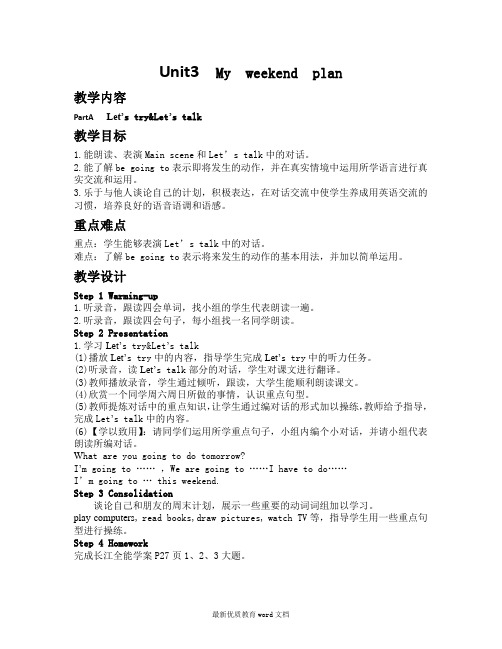
Unit3 My weekend plan教学内容PartA Let’s try&Let’s talk教学目标1.能朗读、表演Main scene和Let’s talk中的对话。
2.能了解be going to表示即将发生的动作,并在真实情境中运用所学语言进行真实交流和运用。
3.乐于与他人谈论自己的计划,积极表达,在对话交流中使学生养成用英语交流的习惯,培养良好的语音语调和语感。
重点难点重点:学生能够表演Let’s talk中的对话。
难点:了解be going to表示将来发生的动作的基本用法,并加以简单运用。
教学设计Step 1 Warming-up1.听录音,跟读四会单词,找小组的学生代表朗读一遍。
2.听录音,跟读四会句子,每小组找一名同学朗读。
Step 2 Presentation1.学习Let’s try&Let’s talk(1)播放Let’s try中的内容,指导学生完成Let’s try中的听力任务。
(2)听录音,读Let’s talk部分的对话,学生对课文进行翻译。
(3)教师播放录音,学生通过倾听,跟读,大学生能顺利朗读课文。
(4)欣赏一个同学周六周日所做的事情,认识重点句型。
(5)教师提炼对话中的重点知识,让学生通过编对话的形式加以操练,教师给予指导,完成Let’s talk中的内容。
(6)【学以致用】:请同学们运用所学重点句子,小组内编个小对话,并请小组代表朗读所编对话。
W hat are you going to do tomorrow?I’m going to ……,We are going to ……I have to do……I’m going to … this weekend.Step 3 Consolidation谈论自己和朋友的周末计划,展示一些重要的动词词组加以学习。
play computers,read books,draw pictures,watch TV等,指导学生用一些重点句型进行操练。
myweekendplan教案

myweekendplan教案【篇一:2014最新版六年级上册unit 3 my weekendplan 教案】unit 3 my weekend plan第一课时a let’s learn make a plan一、教学目标:1. 掌握四组重要短语: visit my grandparents, see a film, take a trip, go to the supermarket2. 掌握重点句子what are you going to do? i am going to ….进行简单的提问与回答关于计划的相关动作,并在真实场景中运用所学语言进行真实交流和运用。
3. 在对话交流中使学生养成用英语交流的习惯,培养良好的语音,语调和语感。
二、教学重难点:教学重点:四个四会词组和两个句型。
教学难点:能够合理和科学地安排自己的周末生活;在真实场景中运用所学语言进行真实交流和运用。
三、教学准备:多媒体课件,单词图片。
四、教学过程:step1 warming-up revision1. greeting2. let’s talk about our life.引用学过句型,多操练交流。
t: what do you do on the weekend?ss: i often…step2 presentation1. let’s learn(1)展示本部分的图片,向学生提出两个问题,并让学生回答。
who are they? what are they talking about?教师组织学生分为3-4人一个小组,尝试着猜想他们在讨论什么,从而引出本节课讨论的有关be going to表示将来时简单计划的话题。
(2)教师展示本节课的短语图片,引领学生学习这些重要的短语,并引导学生利用多种方法记忆短语。
(3)听录音,指导学生完成探究学习1中的内容,并指导学生记忆关键词。
(4)展示重点句型,并加以操练:what are you going to do? i’ m going to…. 组织学生讲所学短语运用到语句中,进行交流练习。
人教PEP版英语六年级上册Unit 3《My weekend plan》教案
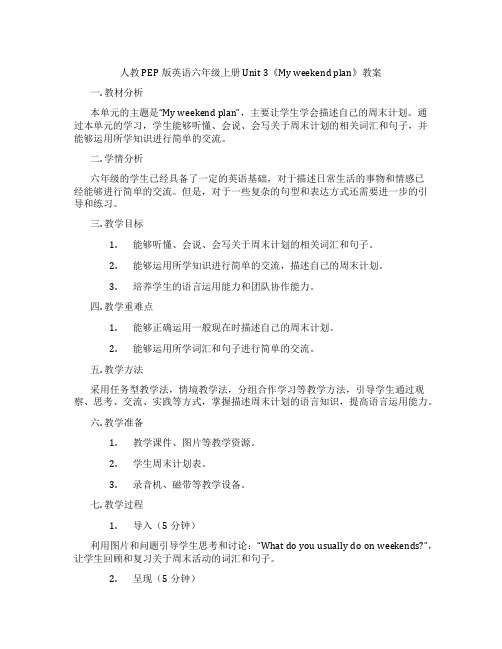
人教PEP版英语六年级上册Unit 3《My weekend plan》教案一. 教材分析本单元的主题是“My weekend plan”,主要让学生学会描述自己的周末计划。
通过本单元的学习,学生能够听懂、会说、会写关于周末计划的相关词汇和句子,并能够运用所学知识进行简单的交流。
二. 学情分析六年级的学生已经具备了一定的英语基础,对于描述日常生活的事物和情感已经能够进行简单的交流。
但是,对于一些复杂的句型和表达方式还需要进一步的引导和练习。
三. 教学目标1.能够听懂、会说、会写关于周末计划的相关词汇和句子。
2.能够运用所学知识进行简单的交流,描述自己的周末计划。
3.培养学生的语言运用能力和团队协作能力。
四. 教学重难点1.能够正确运用一般现在时描述自己的周末计划。
2.能够运用所学词汇和句子进行简单的交流。
五. 教学方法采用任务型教学法,情境教学法,分组合作学习等教学方法,引导学生通过观察、思考、交流、实践等方式,掌握描述周末计划的语言知识,提高语言运用能力。
六. 教学准备1.教学课件、图片等教学资源。
2.学生周末计划表。
3.录音机、磁带等教学设备。
七. 教学过程1.导入(5分钟)利用图片和问题引导学生思考和讨论:“What do you usually do on weekends?”,让学生回顾和复习关于周末活动的词汇和句子。
2.呈现(5分钟)通过课件展示本课的主要词汇和句子,如:“I usually watch TV/play basketball on weekends.”,同时引导学生跟读,确保学生能够正确发音。
3.操练(10分钟)将学生分成小组,每组发放一份周末计划表,让学生用英语完成表格,然后进行小组内的交流和分享。
教师巡回指导,纠正学生的错误,并给予鼓励。
4.巩固(10分钟)设计一个角色扮演的活动,让学生模拟真实的场景,运用所学知识进行对话。
如:“A: Hi, B. What are you doing? B: I’m cleaning my room. A: Oh, really? I’m goingto the movies with my friends this weekend.”5.拓展(10分钟)让学生结合自己的生活实际,思考和讨论:“What will you do next weekend?”,并鼓励学生用英语进行表达。
人教PEP版英语六年级上册Unit 3《my weekend plan》word单元教案

人教PEP版英语六年级上册Unit 3《My weekend plan》word单元教案一. 教材分析《人教PEP版英语六年级上册Unit 3 My weekend plan》主要讲述了学生们谈论自己周末的计划。
通过本单元的学习,学生能够掌握一般将来时的表达方式,以及如何用英语询问和描述别人的周末计划。
教材内容丰富,插图生动,激发学生学习兴趣,同时培养学生的交流能力和思维能力。
二. 学情分析六年级的学生已经掌握了基本的英语语法知识和词汇,具备一定的听、说、读、写能力。
在学习本单元时,学生需要将已学知识与新知识相结合,进一步提高自己的英语水平。
通过对学生学情的分析,教师应针对性地调整教学策略,以提高教学效果。
三. 教学目标1.知识目标:学生能够掌握一般将来时的表达方式,正确运用情态动词will和be going to描述未来的计划。
2.能力目标:学生能够在真实情境中运用所学知识进行交流,提高口语表达能力。
3.情感目标:学生能够培养对英语学习的兴趣,增进与同学之间的友谊。
四. 教学重难点1.重点:学生能够熟练运用一般将来时表达自己的周末计划。
2.难点:学生能够正确使用情态动词will和be going to,并结合时间状语描述未来的计划。
五. 教学方法1.情境教学法:通过设定真实的周末场景,让学生在情境中学习、运用英语。
2.任务型教学法:引导学生参与小组讨论,完成周末计划的任务,提高学生的合作能力。
3.游戏教学法:运用趣味游戏,激发学生的学习兴趣,巩固所学知识。
六. 教学准备1.教学课件:制作精美的课件,辅助教学。
2.教学素材:准备相关的图片、卡片等教学素材。
3.录音设备:用于播放听力材料。
4.课堂活动准备:如角色扮演、小组讨论等。
七. 教学过程1.导入(5分钟)利用图片或故事引入本课主题,激发学生的学习兴趣。
教师提问:“What do you usually do at weekends?”引导学生用英语谈论自己的周末计划。
Unit_3_My_weekend_plan_公开课教案.doc

Unit 3 My weekend planPart B Let’s learn and role playTeaching important points1. 学生能够听、说、读、写本课的五个新单词:dictionary, comic book, word book, postcard;2. 学生能够掌握并使用句型:Where are we going? To the bookstore. What are you going to buy? I’m going to buy …3. 能够用What are you going to do? Where/when…?实行自由地表达与交流。
4. dictionary的拼写Teaching difficult points:区分what where when并作自由的交流与使用Teaching processStep 1 Warm up & Revision1.Greeting2.Sing a song3.Ask and answerShow students the thing and talk about them.___What’s this in English?___It’s a…Step 2 Presentation1. 情境导入(1) Questions:After John and his cousin seeing the film, where are they going? What are they going to buy? Listen and give me the answers●To the bookstore .●They are going to buy a new comic bookThey are going to the bookstore.What other books can you buy in a bookstore? And now let’s learn some new words?2. Learn the new words(1) present “dictionary”拆音读:dic—tion—aryI’m going to buy a dictionary.(2)Present “ comic book”Show them some comic books.Spell the words and write them on the board.(3)Present “word book”Show them a word book: “ Is this a dictionary?”“No, it’s a word book.”Spell together: w—or—d b-oo-k(4)Present “ postcard”Show some pictures, can you tell me which one is the postcard?Listen to the tape.Spell the word.3. Practice the wordsListen to the tape and read after it.4. Ask two students to lead other students to read5. Right hand6. high low voice7. Pick up the apple8. Super dentist9. PracticeA:Do you have comic books?B:What are you going to buy?C:I’m going to buy some comic books?Step 3:PracticeTask 1Today, Amy and her mother are going to the clothes shop(衣服店). Watch the video(看视频)and tell me if you are the shop assitant (售货员),what should you say when you meet the customer(顾客)?Task 2Tomorrow is Amy’s sister’s birthday, Amy want to buy a comic book as the present, now she is going to the bookstore and make a conversation in the bookstore.Let’s perform in the six-student group.3.Feedback.Step 4 Sum upSmall chantWhere are you going? Where are you going? To the cinema. To the cinema. When are you going ? When are you going ? This afternoon, this afternoon What are you going to buy? What are you going to buy? A comic book, A comic book. Ding Ding Dong, Ding Ding Dong Step 4: Assessment1. Make a shopping plan板书设计:What are you going to do?Where are you going?When are you going?dictionary comic book word book postcard。
- 1、下载文档前请自行甄别文档内容的完整性,平台不提供额外的编辑、内容补充、找答案等附加服务。
- 2、"仅部分预览"的文档,不可在线预览部分如存在完整性等问题,可反馈申请退款(可完整预览的文档不适用该条件!)。
- 3、如文档侵犯您的权益,请联系客服反馈,我们会尽快为您处理(人工客服工作时间:9:00-18:30)。
Unit 3 my weekend plan第 1 课时教学要求:1.学生能够听、说、认读句型:What are you going to do tomorrow? I’m going to have an art lesson. I have to do my homework now.2. 学生能够运用句型讨论自己的活动计划:What are you going to do tomorrow? I’m going to3. 学生能够用正确的语音、语调朗读对话,并能进行角色表演教学重点:学生能够听、说、认读句型:What are you going to do tomorrow? I’m going to have an art lesson. I have to do my homework now.教学难点:能够运用句型讨论自己的活动计划教学媒体:Pictures, CAI教学过程:Step One:Warming up and revisionFree talks: What do you often do on the weekend?I often…What are you going to do this weekend?如果有学生回答,那么引出本单元的话题 My weekend plan.Step Two:Presentation1. Let’s try2. New sentence learning(1) What is Sarah going to do?She is going to…(2) 讲解:be going to 的意识是“打算做什么事情”(3) I have 5 weekend activities: go ice-skating; wash clothes; draw pictures; make a snowman; go for a picnic. Which activiy do you like? Please answer my question:T:What are you going to do this weekend?S: I’m going to…3. Let’s talk(1) T: Mike is on the phone with Sarah now. Watch the video and answer the questions:a. What is Sarah going to do tomorrow?b.What is Mike going to do tomorrow?(2)Watch it again and fill in the blanksa. Sarah and her classmates are going to _____________ in Renmin Park.b. Mike have to ________now.(3) Read the dialogue after the tape.(4) Let’s act as Mike and Sarah.Step Three: Consolidation and extension1. 情境设计:It’s Friday, you are talking the weekend plan with your friend. (1) A demo with a studentWhat are you going to do this weekend/tomorrow?I’m going to…What about you?(Let’s …together.)(2) Practise with the partner2. Talk about our classmates weekend plan根据刚才同学们的反馈信息,进行提问What is… going to do?What are…going to do?3. Let’s wrap it up 语法小结(1) Be going to 表达的意思“打算要做的事情”(2) Be 动词的用法复习What ____ Sarah going to do? _____ _____ going to play the piano.What ______ John and Mike going to do? _______ ______ ______ to do homework.Step Four: Assessment and homeworkDo the exercises on the AB.教学反思:第 2 课时教学要求:1. 学生能够听、说、读、写本课核心词组:visit my grandparents,see a film, take a trip, go th the supermarket2. 学生能够运用核心句型What are you going to do today? I’m going to see a film.在真实的情境中进行交流周末计划。
教学重点:三个四会词组和两个句型。
教学难点:X|k | B | 1 . c |O |m能够合理和科学地安排自己的周末生活教学媒体Pictures, CAI,教学过程:Step One: warming up and revision1. Sing a song together: What are you going to do?2. Free talk: What are you going to do tomorrow?I’m going to…Step Two: Presentation and practice1. Present “ this morning, this afternoon, this evening”(1) What are you going to do this morning/ this afternoon/ evening?S: I’m going to…(2) Make the students understand the meaning.(3) Write the words on the board, and spell the words.2. Present “tonight”(1) I’m going to read a book tonight. What are you going to do tonigh t?(2) Understand the meaning: 通过日期和实践的选择让他们明白意思。
(3) Write the work on the board.3. Ask the sentence What are you going to do _______? I’m going to _______.在课件中给出单词银行,让学生进行句型操练。
(1) Read the words or phrases in the word bank.(2) Practice in pairs.4. S arah and Chen are talking about their plan, too. Let’s listen and answer.(1) What is Chen Jie going to do today?She is going to see a film.(2) What is she going to do next week?She is going to __________. ( take a trip)Choose the right picture of “take a trip”Read it and write it on the board.(3) What is Sarah going to do this afternoon?She is going to ________.( the supermarket)go to the supermarket------ be going to the supermarketSpell the word and write it on the board.(4) What is she going to do tomorrow?She is going to visit her grandparentsWrite the words on the board.5. Read the new words after the tape.Step Three: Cosolidation and extension1. A task: It’s Saturday morning now. Two girls are asking the planLet’s help them make a pla n.第 3 课时教学要求:1.学生能够听、说、认读句型:Where are you going? We’re going to…When are you going? We’re going to… We’re going to see a film about space travel.2. 学生能够运用句型What are you going to do? Where are you going? When are you going?进行某项活动计划的讨论。
教学重点:学生能够用正确的语音、语调朗读对话,并能进行角色表演。
学生能够区分并熟练运用句型What are you going to do? Where are you going? When are you going?教学难点:能在实际情景中灵活运用以及正确的回答教学媒体:Pictures, CAI,教学过程:Step One:warming up and revision:Brainstorm1. Sing a song: What are you going to do?2. Read the words quickly: tonight, this morning, this evening, this afternoon, see a filmStep Two:Presentation1. Let’s try2.Let’s talk(1) 承接Let’s try 部分,导入对话学习。
T: What is John going to do next week?(2) Watch and answer课件出示问题:What is John going to do next week?Watch the video(3) 校对答案 He is going to see a film.(4) About the film, Show the students the post of the film讨论关于电影的更多细节The name of the film : Travel to MarsWhat time? Tuesday.The price is half. 40﹩, Now the half price is 20﹩.(5)Watch it again and answer the other questions? 教师板书到黑板Where are they going?When are they going?(6)Read after the tape and imitate it.(7) Practice with the partner.Step Three: Extension1. Talk about “ What? Where? When?”教师示范填写表格T: Where are you going this weekend?S: I’m going to…T: What are you going to do?S: I’m going to2. Talk about with your partner and fill in the form.3. Feedback4. An exercises: choose “where, what , when”_______ are you going to do? I’m going to visit my grandparents. _______ are you going ? I’m going on Saturday morning.________ are you going? I’m going to my grandparents’ home.第 4 课时教学要求:1. 学生能够听、说、读、写本课的五个新单词: dictionary, comic book, word book, postcard;2. 学生能够掌握并运用句型:Where are we going? To the bookstore. What are you going to buy? I’m going to buy …3. 能够用What are you going to do? Where/when…?进行自由地表达与交流。
